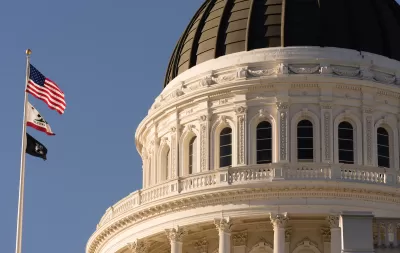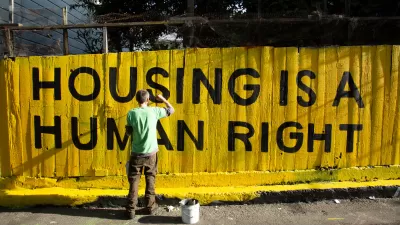Unlike on prior election days, California voters had only one state proposition to decide on March 5, a combination $6 billion general obligation bond and a restructuring of an income surtax, both dealing with behavioral health and homelessness.

March 21 update: “It took 15 days of counting ballots for The Associated Press to call the election. It passed by the narrowest of margins, 50.2% to 49.8%,” reports CalMatters on March 20, a difference of less than 29,000 votes, according to Ballotpedia.
“It’s been nine days since California’s primary election and we’re still not certain if Gov. Gavin Newsom’s ballot measure has passed,” writes Laurel Rosenhall, Sacramento bureau chief for the Los Angeles Times on March 14.
Proposition 1, the $6.4-billion bond that is core to the governor’s plan to beef up California’s mental health system and get people with drug addiction and psychiatric problems off the streets, was still ahead but by the thinnest of margins Thursday morning: 50.2% to 49.8%, as county election officials continue tallying votes.
[See Planetizen, October 18, 2023: Election 2024: California Voters to Decide on $6 Billion Homelessness Bond, and July 31, 2023: California Ballot Measures Would Aid the Mentally Ill and Drug-Addicted Homeless.]
Rosenhall continues:
Though the meagerly funded opposition campaign conceded this week that the measure was “almost certain” to pass, Newsom has not declared victory and the Associated Press has not called the race because it could flip if outstanding votes skew slightly toward the “no” side.
“Meagerly funded” is an understatement. Opponents of the measure raised a mere $1,000 while supporters, backed by the governor, raised nearly $15 million, according to Ballotpedia.
In addition to the linked article, Rosenhall refers readers to LA Times columnist George Skelton who wrote on March 13:
Many politicos were surprised last year when he insisted that his proposal be placed on the March 5 presidential primary ballot. Primary elections are often graveyards for liberal causes.
...
Perhaps if the governor had focused more on selling his confusing ballot measure and less on promoting his national political profile, Proposition 1 would have fared better. But mainly, the proposal did worse than expected because it was placed on the wrong ballot — despite Newsom raising more than $20 million for the campaign and opponents spending virtually zilch.
San Francisco Chronicle columnist Emily Hoeven drew a similar conclusion in her piece published March 6:
That the measure is a nail-biter underscores one of the governor’s biggest political flaws: hubris. Newsom undoubtedly thought that he had Prop. 1 in the bag. He strong-armed state lawmakers into postponing other initiatives originally set to appear on the March 5 primary ballot so that Prop. 1 would have voters’ undivided attention.
...
If Prop. 1 fails, it will arguably be the most stunning political defeat of Newsom’s career. But the loss will also have devastating practical impacts. The consequences of the lack of clinically appropriate behavioral health facilities will continue to reverberate throughout California for decades to come, hobbling the state’s efforts to improve conditions on our streets and provide humane, effective treatment for our sickest residents.
And Newsom will have only himself to blame.
FULL STORY: Newsom’s Proposition 1 is a shockingly close call

Planetizen Federal Action Tracker
A weekly monitor of how Trump’s orders and actions are impacting planners and planning in America.

Restaurant Patios Were a Pandemic Win — Why Were They so Hard to Keep?
Social distancing requirements and changes in travel patterns prompted cities to pilot new uses for street and sidewalk space. Then it got complicated.

Map: Where Senate Republicans Want to Sell Your Public Lands
For public land advocates, the Senate Republicans’ proposal to sell millions of acres of public land in the West is “the biggest fight of their careers.”

Maui's Vacation Rental Debate Turns Ugly
Verbal attacks, misinformation campaigns and fistfights plague a high-stakes debate to convert thousands of vacation rentals into long-term housing.

San Francisco Suspends Traffic Calming Amidst Record Deaths
Citing “a challenging fiscal landscape,” the city will cease the program on the heels of 42 traffic deaths, including 24 pedestrians.

California Homeless Arrests, Citations Spike After Ruling
An investigation reveals that anti-homeless actions increased up to 500% after Grants Pass v. Johnson — even in cities claiming no policy change.
Urban Design for Planners 1: Software Tools
This six-course series explores essential urban design concepts using open source software and equips planners with the tools they need to participate fully in the urban design process.
Planning for Universal Design
Learn the tools for implementing Universal Design in planning regulations.
Heyer Gruel & Associates PA
JM Goldson LLC
Custer County Colorado
City of Camden Redevelopment Agency
City of Astoria
Transportation Research & Education Center (TREC) at Portland State University
Camden Redevelopment Agency
City of Claremont
Municipality of Princeton (NJ)





























